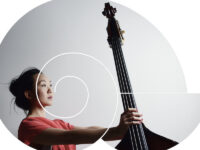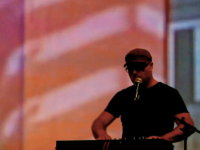On What Times Are These, the Jamie Baum Septet + explores the combination of spoken word, cross-genre compositions, and how to put in music reactions to poems that have profound meaning.
Ten tracks, her talented septet, plus illustrious guests including guest vocalists Sara Serpa, Theo Bleckmann, Kokayi, and Aubrey Johnson, and beautifully weighted compositions create an album that is as rich and full as music can be. Seven of the 10 tracks are responses to works by female poets of the 20th and 21st centuries, including Adrienne Rich (whose poem inspired the title), Marge Piercy, Tracy K. Smith, Lucille Clifton, and Naomi Shihab Nye.
Baum uses influences from diverse cultures and brings them together with astonishing musicianship. The music is understandable and relatable, and Baum manages to weave her musical ideas perfectly around the featured guests and her septet.
The septet is comprised of Jamie Baum on flute and alto flute; Jonathan Finlayson on trumpet; Sam Sadigursky on alto saxophone, clarinet, and bass clarinet; Chris Komer on French horn; Brad Shepik on guitar; Luis Perdomo on piano and Fender Rhodes; Ricky Rodriguez on bass and electric bass; Jeff Hirshfield on drums; and, on three tracks, Keita Ogawa on percussion.
“One by one, the gigs fell like dominoes, and everything shut down” in the spring of 2020, when COVID-19 was in full flow, Baum said. “It was biblical, like the plagues. We’re going along, and then ‘boom,’ we’re stopped in our tracks.” Isolated in a small Manhattan apartment with her husband, Baum composed music that reflected the times.
The result has been described as “a magisterial, multi-faceted artistic statement that fully addresses the existential darkness and political turmoil of the times in question, but also provides moments of great beauty, excitement, and uplifting solace.” That’s precisely what the music is, yet it is also more. What Times Are These is deeply self-reflective at times, yet uplifting, rising, and gloriously free at others.
The ethereal “In Those Years” based on Adrienne Rich’s poem offers harmonies and vocal lines that grab attention, with perfectly placed intervals – including those that jar but are placed so they perfectly emphasize the emotion of the number. The exquisite solo from Sadigursky adds a delicious flavor that mirrors the phrasing of the vocals. “What Kind of Times Are These” is a response to another Rich poem and features Sara Serpa on vocals, her voice adding pitch-perfect class to the vocal lines.
“Sorrow Song” features KOKAYI, Lucille Clifton and Aubrey Johnson. It’s a glorious celebration of rhythm, rap, and vocal instrumentation, with KOKAYI switching from spoken to sung word. This reaction to the poem is counterintuitive since the poem was written about children suffering in war, but it also gives a sense of the spirit of children that never dies. There is some glorious soprano flute from Baum too.
“My Grandmother In the Stars” is a beautiful rendition of a composition in response to Naomi Shihab Nye with Sara Serpa’s vocals adding the perfectly tuned and balanced tone the poem’s atmosphere and words require. The arrangement of the music is astounding, particularly when Sadigursky wraps some gentle, delicious sax lines around the steadfast bass and percussion in the middle section.
Serpa features on “I am Wrestling With Despair” and again adds her free-flowing, perfectly placed interpretation to the number. The leaning time signature begs for relaxation, yet the words cannot allow this, emphasizing the subtleties of the desperation of the poem’s message which was written about the cruelty of the radical right towards women and the poor.
“Dreams” is a madcap escapade into the realms of dark, light, changes, and broken rhythms – created by the ensemble, headed by Baum’s flute and glorious, oomphing of the brass at one point, while Aubrey Johnson’s vocals float across the top in rhythmic waves. “In the Day of Light” is possibly the stand-out track on this album of outstanding music, as it couples the rich, baleful tone of the woodwind against delicate percussion and effectively arranged ensemble work. Also featured is a wonderful solo episode from Luis Perdomo and the percussion of Keita Ogawa.
There is so much to listen to on What Times Are These, so much to ponder and enjoy – from the funky rhythms on “An Old Story” to the beautiful, clever arrangements in Jamie Baum’s compositions of the instrumental numbers that begin and complete the album – “In the Light of Day” and “In the Day of Light.”
“Those two ‘bookends’ share several elements, but are different,” Baum says. “For this final piece, I’m hoping – conceptually and musically – that all of these different things going on at the same time can convey the idea of co-existence. Each instrument has its melodic line and its own voice. Sometimes they all come together and sometimes not, sometimes they are moving in homophony and sometimes in polyphony – but always co-existing and enhancing the other.”
With What Times Are These, Baum and company have achieved something very hard – the delivery of music that speaks not only from the soul of the composer but to the soul of the listener. There are so many excerpts, phrases, lines, and harmonies that one listen will never be enough.
The final track seems to bring all elements together, as Jamie Baum created, but through the album there is an inherent sense of being separate and unique as individual listeners, musicians, composers. In the end, however, the music is the conduit and we are drawn together.
- Milena Casado – ‘Reflection of Another Self’ (2025) - May 4, 2025
- Luis Ianes and Noel Akchote – ‘Seuil’ (2025) - April 12, 2025
- David Dower Trio – ‘Sonder’ (2025) - March 23, 2025




